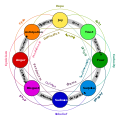Pity
Pity means feeling for others, particularly feelings of sadness or sorrow. In a positive sense it means "sympathy" and "empathy". More commonly 'pity' is a negative judgement of others and their situation.[1] An example of pity is how most people feel about the homeless.[1] Pity and compassion are simillar words but have small differences. The difference is that compassion usually involves help. Meanwhile, pity usually does not include any personal involvement or interaction. [2]
Positive Sense
In a positive sense, pity can mean that a person is sorry for another person, usually because something bad happened to the other person.[3] It can also involve mercy. However, mercy often involves taking action, like compassion. [4]
Negative Sense
Pity can imply superiority, or a person's belief that he or she is better or is in a better situation than another person. Superiority is implied because the person who pities the other person seems to be pitying because he or she is in a better situation than the other person. [5]
Difference from Other Emotions
Sadness
The main difference between pity and sadness is that pity is a feeling for other people, while sadness is a sad feeling for oneself.[5]
Worry
Pity and worry can both be felt towards other people. However, worry is felt towards something that might happen in the future, while pity is felt towards something in the present.
Pity Media
The Human Abstract, a poem in William Blake's collection Songs of Innocence and of Experience, in which he proclaims "Pity would be no more, / If we did not make somebody Poor" (1–2). This version is copy L created in 1795 and currently held by the Yale Center for British Art.
Related pages
References
- ↑ 1.0 1.1 Aaron Ben-Zeév Ph.D.14 August 2010. "Do Not Pity Me". Psychology Today. Retrieved 17 September 2015.
- ↑ David Konstan, Pity Transformed (London: Duckworth, 2001), pp. 21–22
- ↑ (in en) pity. https://dictionary.cambridge.org/dictionary/english/pity. Retrieved 2025-07-14.
- ↑ "What is the Difference Between Mercy and Pity?". Philosophy Stack Exchange. Retrieved 2025-07-14.
- ↑ 5.0 5.1 "Pity". Emotion Typology. Retrieved 2025-07-14.



